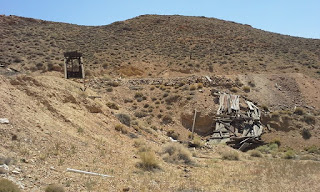Upon returning from an ordinary shopping trip to the nearest
other small town, I turned to my friend who was driving her car with great
composure, we saw each other, yet spoke no word, an unusual pause for us. Words
retreated to the shade of our throats; to rest awhile as our eyes focused on
the hidden years of forgotten joy washed away by inevitable flash floods of
tears.
I found myself slipping into a light blue mood somewhere
between grey sky and green lawns. Her absent voice resonating in the hollow heart
of the small vehicle, the space filled with a blanket of forgiveness that
permeated our common area; we were daughters, we were mothers, women of trust
and tedium.
‘Twelve years’, she said’ and not a single tear, then last
week’ she confided her impulse to spontaneously allow herself to grieve a flow
of what she hesitated to feel as forgiveness;. a strange quietude filling her
profile as she drove with hands on the wheel and mind in the past; oddly
present, mostly whole.
 A rare calm brushed over the day, I knew that the moment
would hang about us, unspoken between calls to needs and chores of a tidy life,
separate, disparate, yet held aloft by silk threads of a strong yet gentler
nature. Trials and trauma swept aside for the passage of our present necessities,
we walked in diverse aisles of commercial must; obeying the do, the don’t of
shopping lists, and as we resurfaced, we saw in each other the wounded animal,
the tender child we had been, and we knew that we had come to the traverse
where the road forks away from pain.
A rare calm brushed over the day, I knew that the moment
would hang about us, unspoken between calls to needs and chores of a tidy life,
separate, disparate, yet held aloft by silk threads of a strong yet gentler
nature. Trials and trauma swept aside for the passage of our present necessities,
we walked in diverse aisles of commercial must; obeying the do, the don’t of
shopping lists, and as we resurfaced, we saw in each other the wounded animal,
the tender child we had been, and we knew that we had come to the traverse
where the road forks away from pain.
Away from years we drag, tears we dry before they swell.
Gutted from the spent drama, we fell softly into the routine of cathartic
consumption, the food of our days, the taste of common delights affordable to
the means of ordinary women in an extraordinary mood. We ditched our worn out
truths with a fork, and poked fun at the small miseries of a miserable age in
times of televised troubles and never ending wars; we were free.
Free from the need to forgive, free to give the past permission
to exit at the nearest overpass. We shook our heads in sympathy for worn out
emotions and basked in empathetic acceptance. She reached out to the memory of
her own mother, within the depth of her gaze. I silently laid mine to rest across
the ocean, inhaling the vapors of one single tear on the car window toward my
present world.





